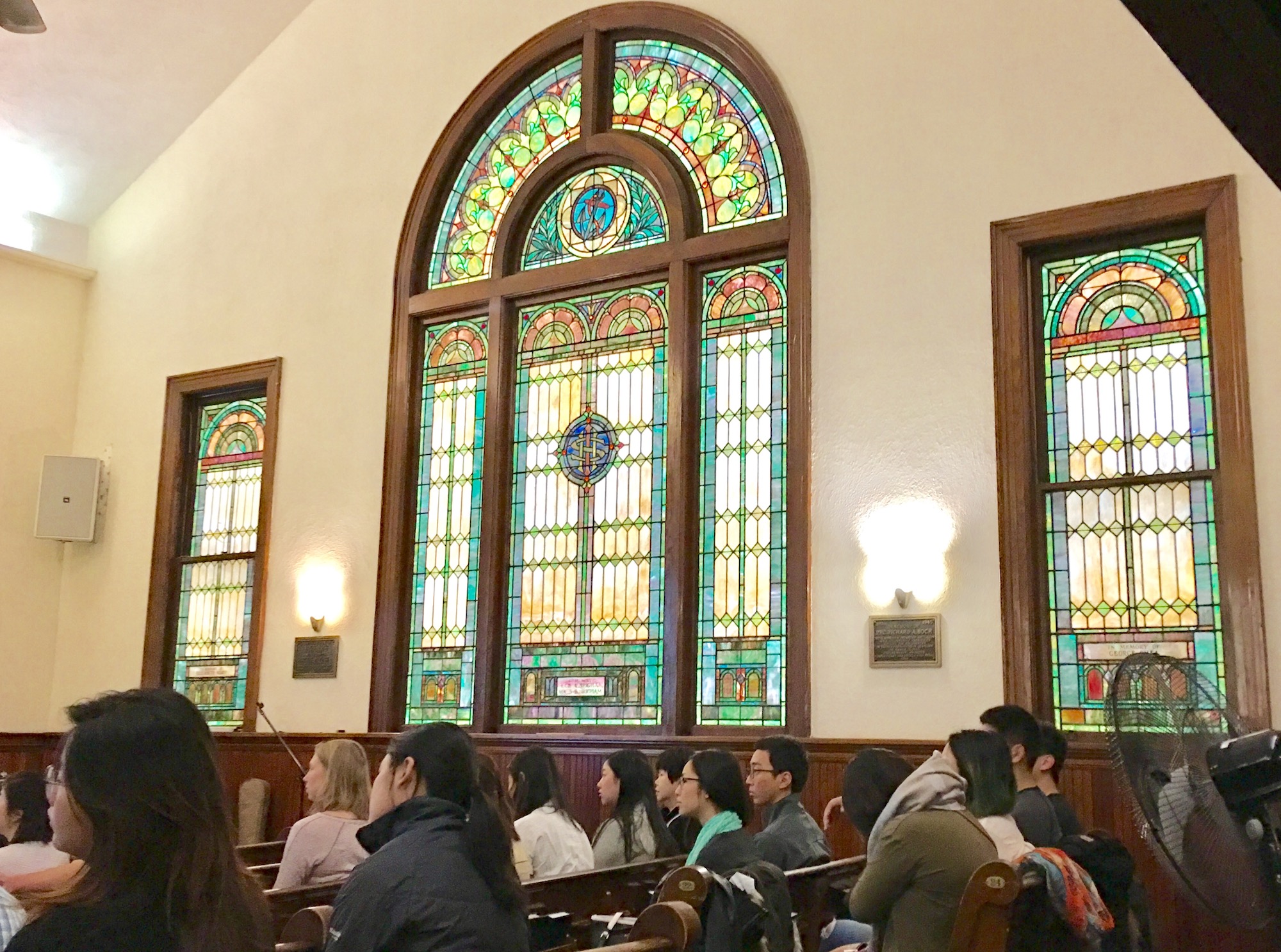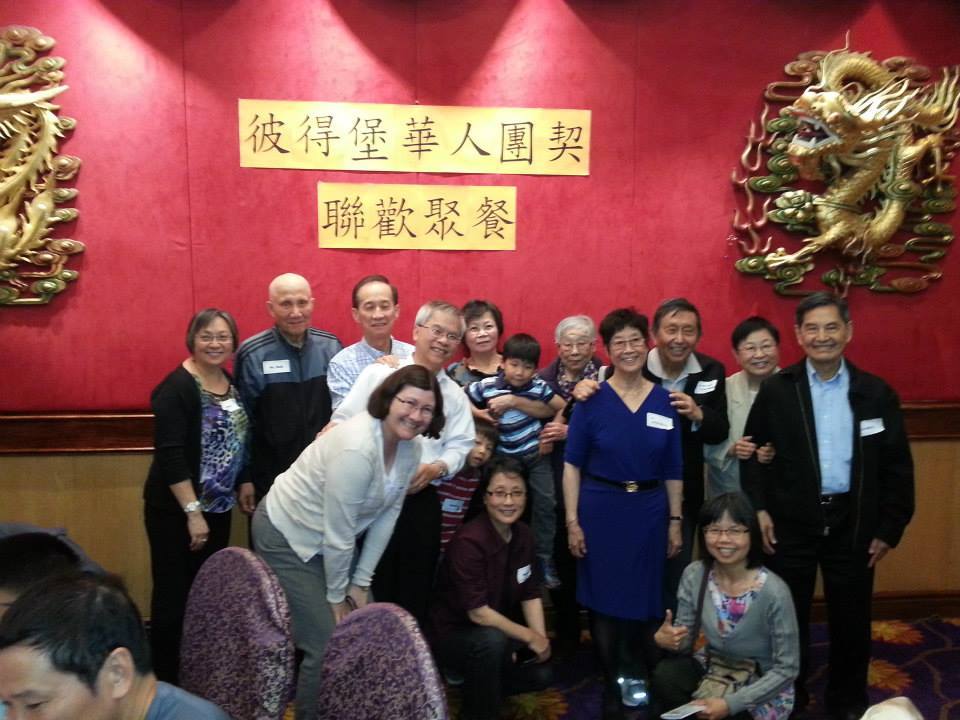It was a pleasure to have shared with the adult cell group of Cambridge Community Fellowship Church last Sunday (Nov. 19, 2017) about the lessons I have learned from my five decades of experience in Christian ministry working with small groups, both church-based and campus-based.
At first, I was reluctant to accept my son Wesley’s invitation, because of a bad experience I had when I was a visiting scientist at UCLA and spoke to a cell group of a big church. This group was full of graduates from Harvard, Stanford, Berkley, and UCLA. They not only questioned my message of costly discipleship based on Luke 14:25-35, but also bragged about their academic and professional successes and their power within their church.
Fortunately, my apprehension proved totally unwarranted, because the CCFC group was just the opposite—very humble and interested in missional living among the less fortunate ones; they were very receptive of my concept of the church as a healing community (Wong, 2009).

Coincidentally, I visited the Bayview Glen Church the next Sunday (Nov. 26) and was pleasantly surprised by Pastor Luke Cooper’s message “All I Want for Christmas is Community.” My wife pointed out that Pastor Cooper’s message covered much of the same ground as my CCFC presentation, which is summarized as follows.
Introduction
I first began with my observation that most of the Christians I know seem to be preoccupied with their personal problems to be friendly, calm, or happy, while most of the Buddhists I have met during my month-long stay in Taiwan radiated with peace, joy, and love, as I have reported a few weeks ago (Wong, 2017a).
Then, I compared the anxious, unhappy, and carnal Christians in affluent North America with the first-century Christians who were able to exude love, joy, peace, patience, and kindness (Gal. 5:22-23) in spite of the hardships and persecutions in a hostile world (one can have a good sense of the impact of the early disciples from both the book of Acts and a recent drama “A.D. The Bible Continues: Kingdom & Empire”).
I am truly troubled by the above juxtaposition. Is it possible that the Church suffers from an unbalanced teaching of cheap grace that focuses on salvation and eternal security based on a simple confession of Jesus as Lord and Saviour without the need for discipleship? In most churches, the only demand on Christians nowadays is to attend church meetings.
In contrast, Buddhism teaches that the root cause of suffering comes from ignorance of our true nature and our attachment to the false self and the material world; therefore, a logical cure to the problem of suffering is to practice the Dharma of wisdom and compassion daily until we fulfill the Buddhist nature in us. There is so much we can learn from their spiritual discipline and compassionate ministry as integral parts of being a Buddhist.
St. Augustine was correct in emphasizing that the Kingdom of God co-exists with the earthly kingdom, governed by different laws and values. The former is characterized by serving and worshiping God. The latter is characterized by serving and worshiping the almighty dollar. When Christians pursue money and power, they become conformed to the world; the best example is the adult cell group in the prosperous church in Los Angeles which I alluded to earlier.
The Bible has clearly warned us not to be conformed to this world (Rom. 12:2). The pursuit of worldly happiness has made us a nervous wreck, and Christians are no exception. The challenge for authentic Christians is learning how to live in the world but not be of the world so that our lives should reflect the light of Christ.
True spirituality is lived out in every aspect of our lives and is evident in love, peace, hope, and joy, regardless of circumstances. The most difficult spiritual discipline is to enter into His rest and experience His peace even in troubled times. This spiritual quality is missing in so many Christians.
Remembering our true identity as a special people called out by God (1 Pet. 2:9) is only the beginning of becoming an authentic Christian. We not only need to know who we are, but also why we meet, why we need the courage to be vulnerable, how to live in harmony, and how to equip each other for God’s ministry. These four principles are vital for cultivating practical spirituality and becoming the salt and light of the world for individuals and for the church.
1. Knowing the Purpose and Mission of Group Meetings (Heb. 10:24-25; Rom. 8:29; John 20:21)
We are not called to listen to singing and sermons as passive spectators. We are called to “spur one another on toward love and good deeds…encouraging one another—and all the more as you see the Day approaching” (Heb. 10:24-25). More specifically, we are called to encourage and equip each other to carry on the Great Commission: “Peace be with you. As the Father has sent me, even so I am sending you” (John 20:21).
God’s mission for the church is to be a holy people dedicated to extending God’s kingdom. The main purpose of meeting regularly is that we may be transformed to the image of Christ—to walk as Christ walked and to do what He did when he was on earth.
The Bible is intended not just to inform us, but to enlighten us and transform every aspect of our lives from the inside out. When the church is not growing or is torn by internal conflicts, most likely it is because Christians have forgotten the initial purpose for their existence and begun to place their personal agenda above God’s original calling.
It was true in the first century, and it is still true today that wholeheartedly supporting a shared mission is the key to group unity, productivity, personal engagement, and happy relationships. When we spread the fragrance of Christ, we will naturally attract others to follow Him. The Gospel is very relevant in today’s secular and postmodern world because it invites us to follow Christ and co-create a kingdom of love, joy, peace, and justice. We meet so that we can be conformed to His image. That is our true calling!
2. Having the Courage to be Vulnerable (Isa. 53:4; John 15:3)
It takes courage to be Christians in a hostile world. It takes courage to stand up for the truth even when it is dismissed as politically incorrect. Ironically, the church becomes strong when it is under persecution, but becomes weak when it is welcomed as part of the consumer materialistic society.
It takes courage to be involved in any community because of the risks involved, such as misunderstanding, discrimination, rejection, and betrayal. It takes even more courage to love someone because it may call for personal sacrifice and risking one’s own life.
Christ has set an example of having the courage to drink the bitter cup and die on the cruel cross so that we may find healing and redemption. Likewise, we should be willing to be wounded so that others may find healing through us.
We are wired for each other and for God. We need community as fish needs water. Alfred Adler has written compellingly about the courage to be part of a community as the cornerstone for wellbeing (Wong, 2017b). Psychology research has abundantly demonstrated that social support is the most effective buffer against stress (Cohen & Wills, 1985), and relationship is the key to happiness and wellbeing (Ward, 2016).
Similarly, Jean Vanier, a Catholic author, considers community not only as a cure for the pain of loneliness but also as a source of joy and strength (Bedard, 2014). This is how Vanier describes community:
One of the marvelous things about community is that it enables us to welcome and help people in a way we couldn’t as individuals. When we pool our strength and share the work and responsibility, we can welcome many people, even those in deep distress, and perhaps help them find self-confidence and inner healing. (as quoted in Bedard, 2014)
This kind of compassionate community does not happen without heavy investment from its members. Looking back, my most successful group experiment was the Peterborough Chinese Christian Fellowship. I invested more than 20 years of my life in this fellowship group and sacrificed my research and personal happiness to minister to foreign students, help refugees from Vietnam, and fight for justice on their behalf.
Such investment has yielded results. Most of the young people from PCCF are still practicing Christians; some have entered fulltime ministry. Personally, the most gratifying thing is that we are still supporting each other through Facebook, meeting occasionally, and continuing personal communications.

When there is a strong commitment to a shared mission and to each other, there will be enough room in every heart to find the needed courage and love to forgive others and support each other in order to carry out the mission.
3. Maintaining Group Cohesiveness and Unity (Eph. 4:2-3; 1 Pet. 3:8; Rom. 12:16)
Whenever a group gathers together, it is inevitable that group members will have different options and ideas about how to get things done. It’s easy to lead as a dictator with unlimited powers of reward and punishment. It demands a lot more wisdom to lead as a missional leader. Over the years, I have experienced several unity crises, when ambitious individuals directly challenged my leadership. I was grateful that I was able to resolve these conflicts with patience and love.
Servant leadership calls for humility, wisdom, and courage to resolve conflicts in an effective and loving way and, at the same time, empower the group to grow in maturity and productivity (Wong & Page, 2003). It also takes a great deal of prayer, compassion, and patience to maintain group unity (Eph. 4:2-3).
Remember that Jesus’ last prayer and main concern was unity and love among his followers (John 17:20-23). Remember that we are one family, one body, saved by the Lord, and
Most of the relational problems in relationships come from our false dichotomy of self versus others. The best antidote to our deep-seated selfishness is the understanding that our survival depends on our oneness. We need to change our concept that life is a zero-sum game to a holistic view that the whole is greater than the sum of its parts. We will all benefit more when we cooperate with each other and function as one than when we compete against each other for a larger share.
A faith community provides a fertile ground for us to learn compassion, humility, gratitude, and how to serve one another. We become more like Christ only through the discipline of maintaining unity in community living.
4. Growing from Ministering to Each Other (Acts 2:42; Eph. 4:11-12; Col. 3:16)
According to Wilfred Bion, the healthiest group is the “Work Group” where members participate in accomplishing a common task; the alternative is “Basic Assumption Groups” driven by emotions and the unconscious need for dependence on a leader or fight-or-flight mechanisms (“The basic assumption group”).
In a church setting, when a cell group focuses on fellowship, it will likely degenerate into a Basic Assumption Group. That is why Ephesians 4:11 provides a blueprint for the cell group to function as a Work Group in which we minister to each other by exercising our spiritual gifts for the purpose of carrying out the Great Commission.
Thus, those gifted in music lead in singing, those gifted in teaching lead in preaching and Bible studies, those gifted in evangelism help newcomers become Christians, those gifted in hospitality make everyone feel welcome. We will grow both qualitatively and quantitatively only when cell groups provide opportunities for all their members to use our gifts to equip each other so that we can extend God’s kingdom on earth effectively.
Not every Christian is called to be a missionary, but they are all called to be missional—to be the salt and light of the world (Wong, 2012). The mission of God can be accomplished only when we equip each other to become like Christ in faith, hope, love, humility, and self-sacrifice in participating in God’s program.
T. Wright, in his book Simply Christian, wrote, “We’re called, here and now, to be instruments of God’s new creation, the world-put-to-rights which has already been launched in Jesus and of which Jesus’ followers are supposed to be not simply beneficiaries but also agents.”
5. Blessings from Sharing and Caring for Each Other (Psa. 133:1; Acts 2:46-47, 4:32)
When we practice the above four principles, we will be blessed with His peace individually and collectively. We will enjoy the true happiness that comes from loving God and loving our neighbors. Such love will transform everything we do. We will no longer feel lonely, helpless, and useless, because we always have each other for emotional, spiritual, and practical support, and we all can play a useful role in building God’s kingdom. When our cell groups become such a friendly, dynamic, and loving community, people will be knocking on our doors wanting to join us.
References
- Bedard, J.-P. (2014, October 3). The healing of
community . The Huffington Post. Retrieved from https://www.huffingtonpost.com/jeanpaul-bedard/the-healing-of-community_b_5901040.html/ - Cohen, S., & Wills, T. A. (1985). Stress, social support, and the buffering hypothesis. Psychological Bulletin, 98(2), 310-357.
- The basic assumption group. (2016). Changing minds. Retrieved from http://changingminds.org/explanations/groups/basic_assumption.htm/
- Whippman, R. (2016, December 8). How the pursuit of happiness has made us nervous wrecks.
Knowledge at Wharton. Retrieved from http://knowledge.wharton.upenn.edu/article/how-the-pursuit-of-happiness-has-made-us-nervous-wrecks/ - Wong, P. T. P. (2009). Renewing the church as a healing community. Christianity. Retrieved from https://www.christianity.ca/page.aspx?pid=13462
- Wong, P. T. P. (2012). How best to prepare missional leaders. In P. Au (Ed)., Glorious ministry: A festschrift dedicated to Rev. Dr. John Kao (pp. 263-267). Toronto, ON: Association of Canadian Chinese Theological Education.
- Wong, P. T. P. (2017a, November 20). Why I love Taiwan. Positive Living Newsletter. Retrieved from http://www.drpaulwong.com/inpm-presidents-report-november-2017/
- Wong, P. T. P. (2017b, October 14). Adler versus Frankl: Similarities and differences. Invited talk presented at the Taiwan Society of Adlerian Psychology at the National Kaohsiung Normal University, Kaohsiung, Taiwan.
- Wong, P. T. P., & Page, D. (2003, October). Servant leadership: An Opponent-Process Model and the Revised Servant Leadership Profile. Address presented at the Servant Leadership Research Roundtable, School of Global Leadership & Entrepreneurship, Regent University, Virginia Beach, VA.
- Ward, M. (2016, December 15). 75-year Harvard study reveals the key to success in 2017 and beyond. CNBC. Retrieved from https://www.cnbc.com/2016/12/15/75-year-
harvard -study-reveals-the-key-to-success-in-2017-and-beyond.html
Cite
Wong, P. T. P. (2017, November 29). Lessons on Christian ministry and cell groups. Dr. Paul T. P. Wong. Retrieved from http://www.drpaulwong.com/lessons-on-christian-ministry-and-cell-groups

 Meaning Conference 2025 will be the INPM’s first in-person conference with a virtual option after the pandemic.
Meaning Conference 2025 will be the INPM’s first in-person conference with a virtual option after the pandemic.